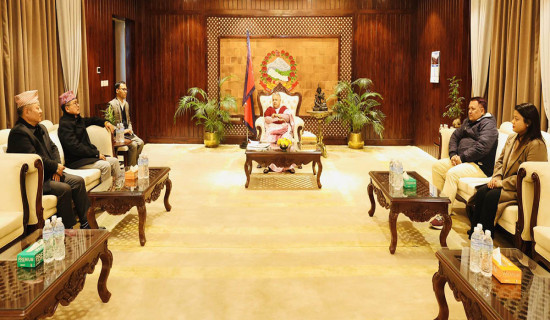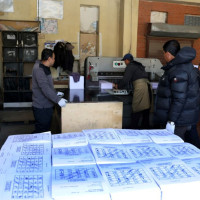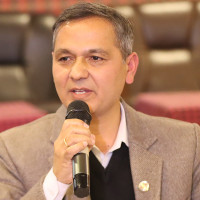- Friday, 9 January 2026
Six months into fiscal year, some local levels fail to unveil budget
Kathmandu, Jan. 8: Bisheshwar Yadav, Mayor of Kamala Municipality of Dhanusha district, is in Kathmandu to find ‘political solution’ to the ongoing deadlock at his local body so that the budget could be unveiled for the current Fiscal Year 2022/23.
As per the constitutional provision, the local governments should announce their budget for any fiscal year about 21 days before the new season begins on Saun 1 of Nepali calendar that usually falls in mid-July. If the budget is not presented at the respective local assembly and approved thereof, no government can spend a penny for any administrative, development and even welfare activities.
But it’s about six months since Kamala is running without budget. After the country was ushered into federalism with the creation of three levels of governments various local expenditures such as the salary of teachers and health workers, small project development and cost of other local activities are mobilised through the local bodies.
The federal and provincial governments allocate various grants for the local governments so that they run their everyday activities as well as development works in a better manner, meet the demands of people and improve service delivery. However, these grants also can be mobilised only after including in the local budget and allocating for specific projects and programmes.
Since they couldn’t get their salaries for the past five months in a row, teachers and health workers have threatened the local government of a strike anytime. “I have fallen on the feet of teachers to beg some time so that I could create an environment to pass the budget and run the economic affairs smoothly,” Yadav said with The Rising Nepal.
Mayor Yadav said that the budget was obstructed purely for ‘political’ reasons. Yadav contested election held in May last year from Nepali Congress defeating Pashupati Yadav who is the district chairman of Janata Samajwadi Party. Likewise, Shiladevi Mandal of the NC was elected as the Deputy Mayor defeating JSP candidate Punita Kumari.
“The opposition party boycotted the government’s policy and programmes and filed a case at the High Court in Janakpurdham. The case is still pending and we are helpless,” he said while expecting that the court might conclude the hearing on the case within next week so that the local body could initiate a fresh process to pass the budget. Meanwhile, Kamala is running without an administrative head. Yadav expressed his hope that Kamala would get the administrative chief by Monday.
While only a week of the first half of the current fiscal year 2022/23 is remaining, seven local bodies have failed to announce the budget, an estimate of income and expenditure, for this year. They all are from Madhes Province.
Four municipalities – Karjanha of Sihara district, Kamala and Nagrain of Dhanusha, Baudhimai of Sarlahi – and three rural municipalities – Aurahi of Siraha, Bishnu of Sarlahi and Yamunamai of Rautahat – are the local bodies running without budget for the entire first half of the current fiscal year 2022/23.
Three weeks ago, the list also had another name, Duduwa Rural Municipality of Banke district in Lumbini Province. Chairman of Duduwa, Narendra Kumar Chaudhary, presented the budget after five months since the current fiscal year began.
The local body had found a consensus among the warring political parties after the employees padlocked the office of the local body.
The Rising Nepal had carried a news report on December 21, 2022 that due to the failure in bringing a budget for this year, all works including development and construction have come to a standstill, employees are not paid and even basic medicines like Cetamol are not available at the health posts there.
About a month ago, health workers and teachers had warned the local government that they would resort to protest programmes if their salary and allowance were not paid. The health workers had submitted a memorandum, including the protest programme to Chief Administrative Officer of Duduwa, Krishna Prasad Paudel.
Chairman Chaudhary had then said that the opposition parties had obstructed the village council meeting and because of it budget couldn’t be approved.
In Duduua, too, the opposition parties blamed the chairman of non-cooperation while Chaudhary said that the CPN (UML) and JSP rallied against him – because he and deputy chair Shaida Bano were elected from the NC.
Worries of federal government
The Ministry of Federal Affairs and General Administration (MoFAGA) had requested the eight local bodies to announce the budget immediately while other concerned agencies like the Commission for the Investigation of Abuse of Authority (CIAA) had inquired about the situation in those units.
“Since your governments have failed in passing the policy and programmes or budgets for the current fiscal year, programmes of social security, education, health and governance have been affected. The ministry has received complaints about this,” the MoFAGA said in a letter to those local governments.
The ministry maintains an online database of the details about the budgets of the local governments.
However, the federal and provincial governments can’t direct the local bodies in any of their internal affairs, they have a full autonomy guaranteed by the constitution. It’s at the discretion of the local assembly to pass the budget.
“Budget allocations can be implemented only after passing the budget from the legislative body of the local government. Federal and provincial governments can’t intervene in the process, they can only facilitate in it,” said Dr. Uma Shankar Prasad, former member of the National Planning Commission.
Conflict among political parties
As it was visible in case of Kamala and Duduwa, the impasse in case of budget is the conflict among the political parties, according to Dr. Prasad. The conflict has two facets: between the mayor/chairperson and deputy mayor/deputy chair or elected chief/deputy chief and opposition political parties that lost in the election.
As all the local governments that failed to present the budget by now are from Madhes Province, he said that the reasons could be found in the deep-rooted culture of feudal society in the region.
“We have semi-feudal societies in Madhes that deny transition to the concept of modern egalitarian society. The complexity among the political class created by the feudal culture could be the major reason behind this conflict,” said Dr. Prasad.
Chairman of the Municipal Association of Nepal (MuAN), Bhim Prasad Dhungana, who is the Mayor of Neelakantha Municipality in Dhading, seconded Dr. Prasad. “The reason behind the failure to announce the budget is not related to the capacity of the elected representatives or administrative staff. It’s because of the political conflict,” he said.
He maintained that the MuAN is communicating with the local governments that failed to present the budget of this year and would support them in finding solutions to the crisis. Meanwhile, he suggested that the elected representatives should be accommodating the demands and prescriptions from the opposition parties as well.
Last year, 12 local bodies were running without budget until March or by the end of the third quarter of the fiscal year. The main reason behind this malady then was also the conflict of interest among the representatives of the respective local body, especially between the chair and vice-chair. A total of 151 local governments failed to present their budget in time last year 2021/22.
However, the number dropped down to 71 local governments – 30 municipalities and 41 rural municipalities, this year.
Budgeting system
The local bodies should complete their budgetary process in seven steps. In the first step, they should create pre-planning including the estimates of income and expenditure so that they could submit it to the federal government and get the budget ceiling from the latter.
After getting the ceiling of the budget from the federal government, local governments should estimate the sources of income and set the budget limit. Then plans and programmes of villages or towns are selected. In the fourth step, selection and prioritization of plans at ward level happens which is followed by the formulation of budget and programmes.
In the sixth step, the local governments get the budget passed from the municipal executive. In the final step, the budget is passed from the municipal assembly.
The budget-making process begins from mid-January every year, about more than five months before formulating the final budget statement. The local bodies should submit the estimated details of their income and expenditure by mid-January and obtain the ceiling of the budget by mid-April from the federal and provincial governments.





-square-thumb.jpg)







-original-thumb.jpg)



